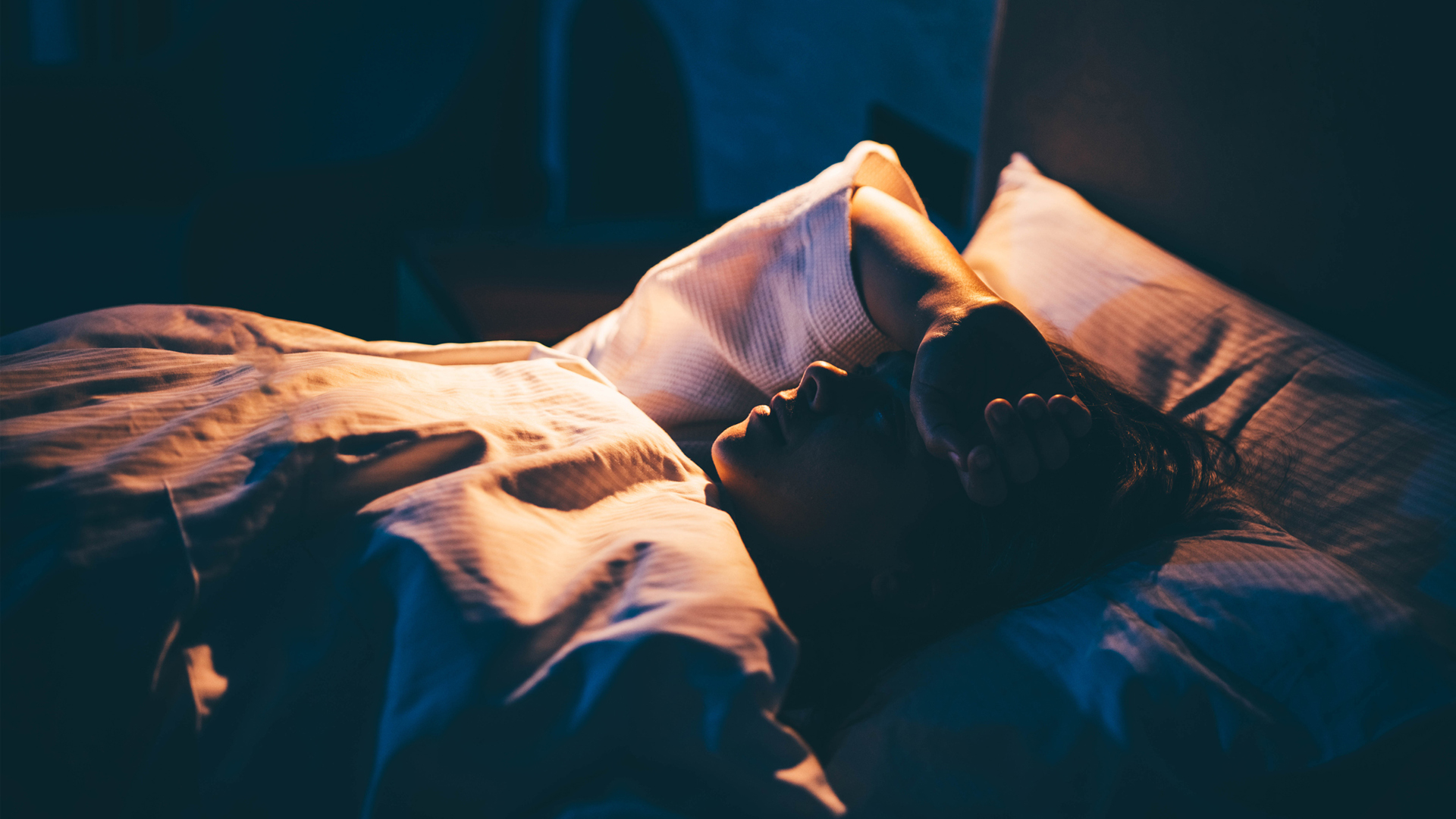Insomnia: Causes, symptoms and treatment
Insomnia is a sleep disorder that makes it difficult to fall or stay asleep.

Insomnia is a sleep disorder characterized by difficulties falling asleep, staying asleep or getting good quality sleep.
According to a 2022 review published in the journal Sleep Medicine Clinics, approximately 10 percent of the global adult population suffers from an insomnia disorder, while 20% experiences occasional insomnia symptoms.
Insomnia can impact physical and mental health. Individuals suffering from this condition can feel sleepy during the day, have difficulty concentrating and learning and may feel irritable or anxious, according to the National Institutes of Health. Sleep-deprived individuals also tend to have high levels of the stress hormone cortisol and decreased immunity, a 2022 review published in the journal Sleep Medicine Clinics reports.
According to the NIH, insomnia can be classified as short-term or long-term (chronic). Short-term insomnia may last for a few days or weeks and is usually caused by stress or changes to a person's schedule or environment. Chronic insomnia is diagnosed when the symptoms occur three or more nights a week, last more than three months and cannot be fully explained by another health problem.
The definition of insomnia has changed with the latest edition of the International Classification of Sleep Disorders, according to a 2021 review published in The Journal of Neuropsychiatry and Clinical Neurosciences. The current focus is now on the length of symptoms, rather than the causes of the condition, as this approach may better reflect the complexity of this disorder. However, many experts, including those Live Science spoke to, still use the terms primary or secondary when referring to the condition.
Insomnia: Causes
Charmain Keane, a clinical psychologist in England, told Live Science that primary insomnia describes difficulties with falling asleep or staying asleep that are not related to another medical condition.
"The causes of primary insomnia could include stress related to life events such as a new job or death of a loved one," she said. "It could also be related to poor sleep habits, such as an inconsistent bedtime, eating too late at night or not having a regular routine due to shift work."

Charmain Keane is an experienced clinical psychologist with a demonstrated history of working in the hospital and healthcare industry. She received her doctorate, focused in clinical psychology, from the University of East London in England.
There are three subtypes of primary insomnia, said Alison McClymont, a psychotherapist in England: Idiopathic (without any known cause), stress-related, and sleep state misperception, where the sufferer believes they have insomnia despite having adequate sleep.
"This type of 'false insomnia' is common if people have suffered previous primary insomnia and may be related to anxious thoughts about not sleeping or getting too little sleep," McClymont said.
In some cases, insomnia is a side effect of another medical condition (such as sleep apnea, hypothyroidism or restless leg syndrome), in which case, the disorder is known as secondary insomnia, according to the NIH.
Biological factors
According to a 2021 review published in the journal Physiological Reviews, insomnia may be caused by disruptions in brain circuits regulating emotion and arousal, rather than in circuits involved in sleep regulation as previously thought. Certain individuals may be less able to process negative emotions, the authors said, which may lead to their brains being hyperstimulated. This excessive stimulation may then impede restful sleep.
In addition, a 2020 review published in the journal Sleep Medicine Reviews reported that stroke may also lead to sleeping disorders.
Psychological factors
Kerry Irving, a senior clinical psychologist at Kooth, a digital mental wellbeing platform in England, told Live Science that while it is not always clear what triggers insomnia, it can be associated with stress and anxiety.
"Periods of anxious thoughts or rumination are among the most common reasons people stay awake at night," he said. "This is when we continually think the same thoughts over and over. It can make it difficult to fall asleep, especially if those thoughts are particularly scary and worrying."
Insomnia may be experienced during periods of great stress or emotional distress such as a job loss, a bereavement or a divorce, McClymont said. "In these circumstances the condition is likely to be transient due to its direct connection with an emotional stressor," she said.
Lifestyle factors
Shift workers are at a particularly high risk of developing insomnia, McClymont said, with a 2021 review published in the journal Sleep Science finding it can affect up to 76.4% of shift workers. "Certain jobs may make a person more susceptible to insomnia by working hours that alter their circadian rhythms," she said. "The circadian rhythm tells the body when to be tired and when to be awake."
Certain medications, such as asthma and cold medicines, can also cause insomnia. Commonly used substances such as caffeine, tobacco and alcohol can also contribute to symptoms, according to the Sleep Foundation.
A poor sleeping environment or engaging in sleep antagonizing behaviors, such as eating heavy meals, performing high intensity exercise or high screen exposure close to bedtime, may be disruptive to our sleep-wake cycle, Dr. Abhinav Singh, medical director of the Indiana Sleep Center, told Live Science.
A 2022 review, published in the International Journal of Environmental Research and Public Health, suggested that digital addiction, defined as harmful dependence on digital media and high-tech devices, may be another predisposing factor. Some studies indicated that it may partly be caused by exposure to light at night, such as on a computer or smartphone screen. This so-called "blue light" may affect the sleep-wake cycle, while limiting exposure to digital screens can improve quality of sleep, according to a 2020 meta-analysis published in the journal Sleep Advances.
Insomnia: Symptoms
According to the Sleep Foundation, insomnia occurs when a person experiences at least one of the following sleep issues:
- Trouble falling asleep
- Trouble staying asleep throughout the night
- Unwanted early morning waking
In addition, a person must have at least one of several daytime symptoms related to their sleeping problems:
- Fatigue
- Impaired attention or memory
- Trouble with work or social performance
- Irritability or disturbed mood
- Sleepiness
- Behavioral issues, like hyperactivity or aggressiveness
- Decreased motivation
- Increased accidents or mistakes
- Worries about one's sleep
Insomnia: Risk factors
Women tend to be more at risk of developing sleep disorders, mostly due hormonal shifts associated with perimenopause and the menopause, Keane said.
Age is another predisposing factor, with insomnia being one of the most common sleep disorders encountered in the geriatric population, according to a 2018 review published in the Journal of Clinical Sleep Medicine.
Mental health difficulties may also contribute. "Chronic mood disturbance such as anxiety or depression are stress factors for insomnia, as is alcohol or substance misuse," McClymont said.
Genetics may also play a role in one's risk of developing insomnia, according to a 2017 study published in the journal Nature Genetics. The researchers analyzed the DNA of 113,000 people with an average age of 57, asking them about sleep issues. They found seven genes that were more common in those who had insomnia, which in this study was defined as "usually" having trouble going to sleep or waking up in the middle of the night.
In fact, results from a 2021 meta analysis published in the journal Sleep Medicine Reviews suggest that the heritability of insomnia may be as high as 39%.
Insomnia: Diagnosis
To diagnose insomnia, doctors will ask patients a number of questions about their sleep habits, such as how often they have trouble sleeping, how long it takes them to fall asleep and how often they wake up at night, as well as what their routine before bedtime is like. Patients may consider keeping a sleep diary for a week or two to help answer these questions, writing down when they fall asleep, wake up and take naps.
Doctors will also take a medical history, which includes questions about the patient's health problems, medications, mental health conditions and work and leisure habits, as well as whether the patient has recently experienced stressful life events. Doctors may also conduct a physical exam, which may include blood tests to check for thyroid problems that may cause sleep disturbances.
An overnight sleep test may be needed if doctors think that a patient's insomnia may be caused by another sleep disorder, such as sleep apnea.
Insomnia: Treatment
According to a 2022 review published in the Lancet, the recommended first-line treatment for insomnia, whether the underlying cause has been identified or not, is cognitive behavioral therapy for insomnia (CBT-I). This addresses the patient's beliefs and actions around insomnia. Pharmaceutical approaches may be used, but there is no agreement as to which treatments are the safest or the most effective. Both CBT-I and pharmaceutical approaches may reduce the symptoms of insomnia, but only CBT-I has shown durable long-term effects after stopping the treatments.
However, it can be difficult to access a professional who can deliver CBT-I. For those patients, a 2020 review published in The American Journal of Managed Care reported that digital cognitive behavioral therapy for insomnia (dCBTI) may be a cheaper and more scalable option. However, there is not enough evidence to suggest that it has the same effects as traditional face-to-face therapy, the researchers said.
How insomnia is treated may depend on whether the symptoms are classified as transient (lasting less than a month), short term (one to six months) or chronic (lasting beyond six months), McClymont told Live Science.
"For transient or short term insomnia, a doctor or healthcare provider may look to prescribe a sleeping aid such as a benzodiazepine," she said. "For chronic insomnia, you may be encouraged to focus on more long term solutions such as therapy or lifestyle changes. As certain types of sleeping aids can become habit and are fatal if used incorrectly, they are not recommended to be used for more than short periods of time and only ever as prescribed."
Patients with insomnia are often encouraged to introduce lifestyle changes that promote better sleep hygiene, Keane said. "[These may include] setting a regular time to go to bed and wake up, avoiding alcohol or caffeine close to bedtime, and reducing screen time before bed as phones and television can stimulate you and make it more difficult to fall asleep."
For secondary insomnia, lifestyle changes may be more focused on managing the underlying health condition, Keane said.

Pharmaceutical approaches for insomnia include over-the-counter and prescription treatments. However, Carolina Goncalves, a superintendent pharmacist at Pharmica in England, told Live Science that over-the-counter treatments are short-term solutions and are not intended for use on a continuous basis. Patients should speak with their doctor before using over the counter products that contain antihistamines.
Prescription drugs for insomnia include benzodiazepines, non-benzodiazepine hypnotics and antidepressants, Goncalves said, however these treatments carry a risk of side effects, including residual drowsiness, risk of dependance, tolerance and withdrawal symptoms.
Patients with insomnia may also be prescribed melatonin supplements. However, there is no clear evidence to suggest that taking melatonin actually improves sleep or sleep quality. There are also certain considerations to discuss with a medical professional before embarking on a course.
This article is for informational purposes only and is not meant to offer medical advice.
Additional resources
Sign up for the Live Science daily newsletter now
Get the world’s most fascinating discoveries delivered straight to your inbox.

Rachael is a Live Science contributor, and was a former channel editor and senior writer for Live Science between 2010 and 2022. She has a master's degree in journalism from New York University's Science, Health and Environmental Reporting Program. She also holds a B.S. in molecular biology and an M.S. in biology from the University of California, San Diego. Her work has appeared in Scienceline, The Washington Post and Scientific American.
- Anna GoraHealth Writer










